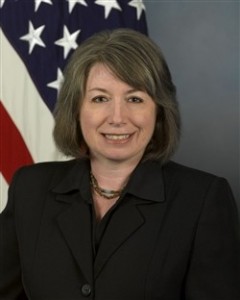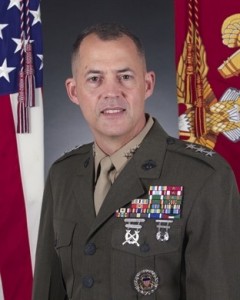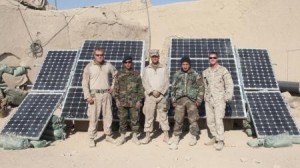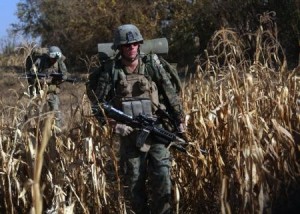 On September 9, the Center for Strategic & International Studies (CSIS) hosted the latest round of their Ground Forces Dialogue. The afternoon’s topic was operational energy in the next decade; featured speakers were the Assistant Secretary of Defense for Operational Energy Plans and Programs, Sharon Burke, and the Joint Chiefs of Staff Director of Logistics, Lieutenant General Robert Ruark. The discussion focused on two main areas: the changing global energy portfolio’s impact on national security and the increasing demand to cut the logistics tether caused by energy needs.
On September 9, the Center for Strategic & International Studies (CSIS) hosted the latest round of their Ground Forces Dialogue. The afternoon’s topic was operational energy in the next decade; featured speakers were the Assistant Secretary of Defense for Operational Energy Plans and Programs, Sharon Burke, and the Joint Chiefs of Staff Director of Logistics, Lieutenant General Robert Ruark. The discussion focused on two main areas: the changing global energy portfolio’s impact on national security and the increasing demand to cut the logistics tether caused by energy needs.
 Despite that American net imports of petroleum are currently down to around 36%, and continuing in a downward trend, the global energy portfolio still impacts the United States in several ways. Since petroleum is a globally traded commodity, even if America didn’t import a single barrel of oil, fluctuations in the global price will still impact prices in America. At the same time, China overtook the United States as the largest energy consumer in 2010, and its domestic production is insufficient to meet demand, leading China to increasingly engage around the world in order to secure its access to energy. Finally, state owned companies control 90% of the world’s oil reserves and 75% of its oil production; many countries depend on oil consumption and oil prices to balance their domestic budgets. The convergence of these three trends promises that even if the United States becomes energy self-sufficient, it cannot afford to disengage from the global stage. It also promises that the global energy portfolio is going to grow increasingly complex and fragile, as states like India and Brazil try to secure their own energy supply. Partnered with an unalterable geography that produces global shipping choke points, the global energy portfolio promises to continue to be an issue that the United States cannot ignore.
Despite that American net imports of petroleum are currently down to around 36%, and continuing in a downward trend, the global energy portfolio still impacts the United States in several ways. Since petroleum is a globally traded commodity, even if America didn’t import a single barrel of oil, fluctuations in the global price will still impact prices in America. At the same time, China overtook the United States as the largest energy consumer in 2010, and its domestic production is insufficient to meet demand, leading China to increasingly engage around the world in order to secure its access to energy. Finally, state owned companies control 90% of the world’s oil reserves and 75% of its oil production; many countries depend on oil consumption and oil prices to balance their domestic budgets. The convergence of these three trends promises that even if the United States becomes energy self-sufficient, it cannot afford to disengage from the global stage. It also promises that the global energy portfolio is going to grow increasingly complex and fragile, as states like India and Brazil try to secure their own energy supply. Partnered with an unalterable geography that produces global shipping choke points, the global energy portfolio promises to continue to be an issue that the United States cannot ignore.
On the other side, the operations in Iraq and particularly in Afghanistan have demonstrated to the armed forces the weight that energy demands put on their logistics. Beginning with the operational pause during the invasion of Iraq, U.S. forces have been shown that logistics can constrain operations as much as it enables them. The IED threat made logistics convoys vulnerable in an unprecedented way and the small, isolated garrisons in Afghanistan make these convoys more necessary than ever. Reducing the logistics foot print means fewer convoys and fewer casualties. On another level, operational energy improvements led to the improvement of combat operations; for instance, by utilizing solar recharging, India Co, 3rd Bn 5th Marines conducted a three week long patrol in 2010 without a battery resupply, which is typically done every two to three days. Additionally, other technologies have allowed some patrol bases to reduce their fuel consumption by 90%. Tactically, smarter energy consumption means a severing of the logistics tether that constrains operations; fiscally it can mean drastic savings for the Department of Defense as a whole.
 Moving forward, Assistant Secretary Burke remarked that the Department of Defense is not picking a technology winner; instead they are picking a problem and allowing technology to solve it. Furthermore, sequestration will hit some energy technology developments, but will not derail over trend of making the armed forces more energy efficient because every contract going forward will take energy concerns into account. General Ruark dispelled the notion that a cultural change is needed in the armed forces, explaining that a culture of simplifying logistics and enabling the warfighter to fight more efficiently is already present. He also explained that since the Pakistani government closed NATO supply routes several years ago, war game exercises have begun to include logistical hurdles in their planning instead of assuming that they would always work out.
Moving forward, Assistant Secretary Burke remarked that the Department of Defense is not picking a technology winner; instead they are picking a problem and allowing technology to solve it. Furthermore, sequestration will hit some energy technology developments, but will not derail over trend of making the armed forces more energy efficient because every contract going forward will take energy concerns into account. General Ruark dispelled the notion that a cultural change is needed in the armed forces, explaining that a culture of simplifying logistics and enabling the warfighter to fight more efficiently is already present. He also explained that since the Pakistani government closed NATO supply routes several years ago, war game exercises have begun to include logistical hurdles in their planning instead of assuming that they would always work out.
The take-away from the discussion is that the Department of Defense is well aware of energy issues on the strategic, operational, and tactical levels. The department can also point to programs and initiatives over the last decade that shows tangible results. By incorporating this new awareness into future contracts, energy efficiency technologies will spread across the Department of Defense, saving money and enabling operations.
The post CSIS: Ground Forces Dialogue event – Operational Energy in the Next Decade appeared first on American Security Project.



